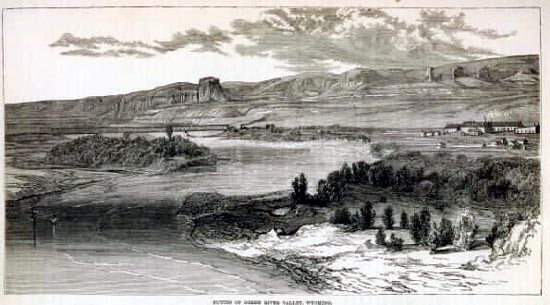
Green River City, 1885
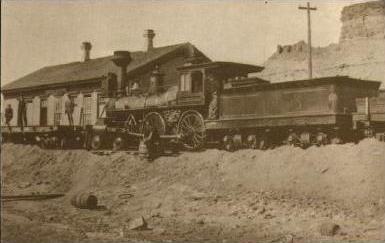 Engine No. 86, Green River City, 1869, photo by Wm. H. Jackson
Engine No. 86, Green River City, 1869, photo by Wm. H. Jackson
In 1869, William Henry Jackson undertook a photography
expedition along the Union Pacific. Jackson left Omaha and purchased a ticket to the
next town. There he would take photographs similar to those
that had earlier been taken by A. J. Russell, an
official photographer of the Railroad. When Jackson had raised enough money, he would
then purchase a ticket to the next stop, working his way along the line to
Salt Lake. The photo, above right, is of the same locomotive as that in a
stereopticon photo of Engine No. 86 which
had been taken the year before by A. J. Russell. Jackson's photography came to the
attention of F. V. Hayden, who recognized that photographic documentation of his
expeditions were vital to receiving further funding. Hayden offered the position of
photographer for his 1871 expedition to Jackson without pay. Jackson's photographs assured his
later success which included service on Hayden's later expeditions.
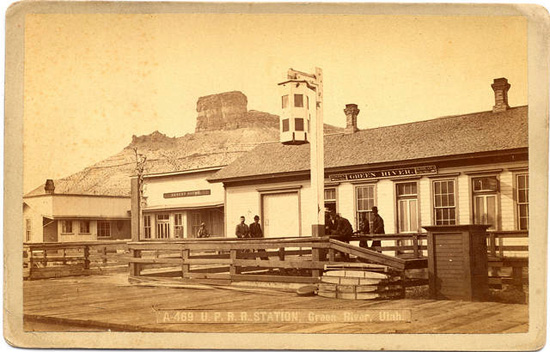
Green River Depot, photo by Charles Weitfle courtesy of
Paul Weitfle, III.
The caption on the photo is in error. The photo is not of Green River, Utah.
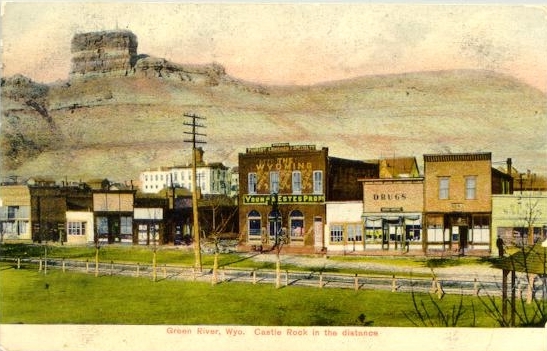
Green River, 1908
Among those who would frequent both Rock Springs and Green River City were members of the Wild Bunch
who would use nearby Brown's Hole or Park as a refuge. Although not a member of the Wild Bunch, one
who would often be in the area was Charlie Crouse who at one time employed Butch Cassidy in
his butcher shop in Rock Springs. According to one source,
Crouse would butcher rustled cattle from Brown's Park, Colo., where he also maintained
a ranch. Crouse (1851-1906) maintained a good relationship with the Wild Bunch although he was not an
actual member of the gang. Crouse's children themselves were a bit wild. In one instance
his two soms, Clarence and Stanley, drunk, rode into Linwood, Utah, stark naked, roped a local
blacksmith and part-time deputy sheriff and craps dealer, Pete Miller, and dragged Miller around town. Ultimately,
two locals rescued Miller. Miller was employed at a gambling establishment and saloon just across the border in
Wyoming, known as the "Bucket of Blood." The advantage of the Bucket of Blood was that one could elude the law by changing
jurisdictions. All that was nececesary was to step out the back door. Nearby was an
octagonally shaped dancehall known as the "Roundhouse."
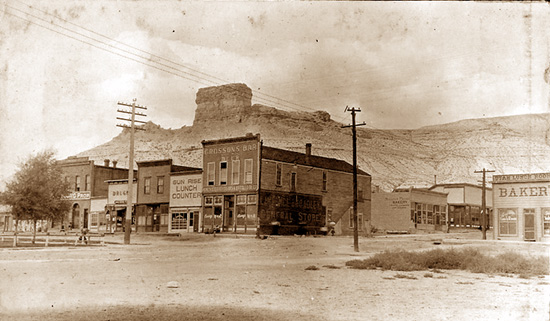
Green River, approx. 1907
One of the more famous guests of the Green River jail was the black rustler, Isom Dart (1855-1900). Dart was placed
in the jail on suspicion of murdering a Chinese cook who disappeared after winning several hundred dollars from
Dart in a fixed card game. Dart was housed in the same cell with a South Pass City miner, Jesse Ewing.
Ewing was sometimes referred to as the "ugliest man in South Pass City" because of a
badly disfigured face arising out of an
unfortunate meeting with a grizzly. Ewing was also mean, "Mean", as they say,
"Mean to the bone." During the night, Ewing beat Dart into submission.
The next morning, when breakfast was served, Ewing required Dart to get down on his hands and
knees so that Ewing could use Dart's back as a table, there being none in the cell. Ultimately, the Chinaman turned up and
Dart was released. Dart was shot and killed by Tom Horn on Oct. 3, 1900, in
Brown's Park, Colo.
In South Pass City, Ewing got into a mining dispute with one Coulter, with the
result that Coulter had to spend the night in the jail. During the night, Ewing took pot shots at
Coulter through the jail cell window but fortunately missed. Ewing, however, was not one to give up on a grudge. Later, when Coulter
lay upon his death bed, Ewing again took pot shots through Coulter's window missing
the dying man by inches.
The occasion with with Dart was not Ewing's only visit to the Sweetwater County Jail. In
1880, he was held for a short period of time on behalf of Utah authorities. Ewing in a
gambling dispute murdered a miner named Charlie Robinson in Brown's Hole. Brown's Hole was so
isolated that the only way from the Utah portion to the rest of Utah was
through Wyoming. Ewing was found to have acted in "self defense." Another time when Ewing was
living in Green River City, he attacked Sheriff Hugh McPhee with a knife. The
Sheriff took the wind out of Ewing's sails by bopping Ewing over the head with a six-shooter.
Ewing's career ended in a dispute with Frank Duncan over the affections of
"Madame" Forrestal, a Green River City "professional" woman. The denouement
of the relationship was the death of Ewing with Ewing's own Winchester and the
departure from town of Duncan and Madame Forrestal.
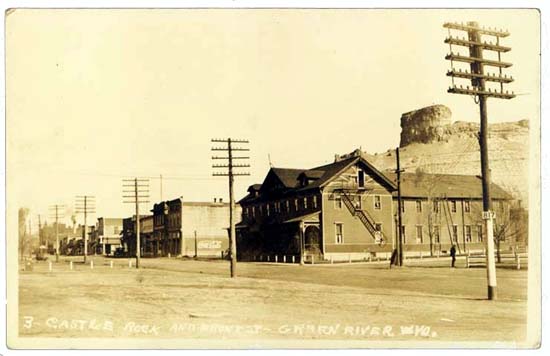
Green River, undated
Next page Green River continued.
|